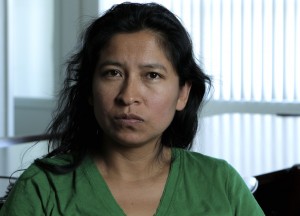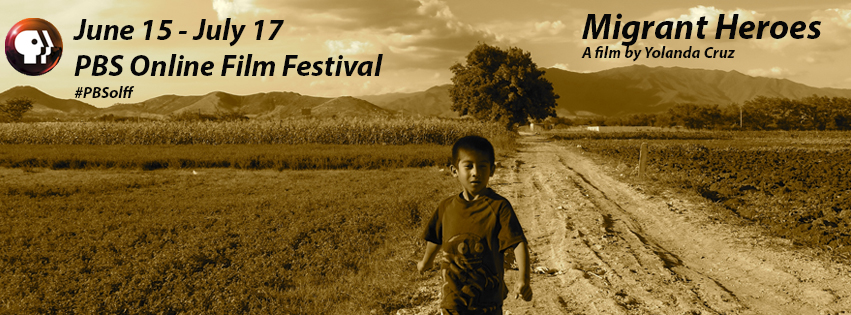Tags: #pbsolff, filmmakers, filmmaking, hugo morales, Indies, la raya, latino, latino stories, LPB, Mexico, migrant heroes, oaxaca, PBS, pbs online film festival, pbsshorts, petate productions, public media, pubmedia, radio bilingue, yolanda cruz
Currently streaming online as part of the 2015 PBS Online Film Festival, Migrant Heroes is an innovative webseries that celebrates migrants whose work has contributed to the improvement of their communities. Consisting of 3 short documentaries, the aim of the series is to empower a younger generation through the celebration of the everyday heroes of migrant communities. In this episode, we meet Hugo Morales, a Mixtec Indian from Oaxaca, Mexico, who as a child immigrates with his family to the US. A California farmworker at first, he eventually graduates from Harvard Law before creating Radio Bilingüe – a trilingual radio station that caters to the needs of indigenous immigrants. This short and innovative film explores his life and work through animation and documentary elements.

LPB caught up with filmmaker Yolanda Cruz about the making of her short documentary film. An independent filmmaker from Oaxaca, Mexico, she is a 2011 Sundance Screenwriting and Directing Lab Fellow and an alumna of the Sundance Institute Native Lab. Her work has screened at the Sundance Festival, the Guggenheim Museum, and Park la Villette in Paris. El Reloj, Yolanda’s second fiction short film, launched by Petate Productions and Latino Public Broadcasting, premiered at the Morelia International Film Festival in 2013. She holds an MFA from the UCLA School of Theater, Film and Television. Her feature, La Raya (produced by Canana Films), is currently in development.
Be sure to watch and vote for Migrant Heroes on PBS.org! Continue the conversation online using the hashtag #PBSolff. Watch, vote, share!
Migrant Heroes is currently streaming on PBS.org as part of the 2015 PBS Online Film Festival. What inspired you to create the series?
My goal in creating this series of short documentaries was to celebrate the everyday heroes in the migrant communities within the United States. My hope is that, by promoting a positive image of migrants in our communities, migrant workers will be inspired to follow in the steps of our heroes, helping them counterattack how the media portrays and generalizes the lives of Latinos in the U.S.
In this episode of Migrant Heroes, we meet Hugo Morales, the Executive Director and co-founder of Radio Bilingüe, Inc. Why did you decide to highlight Mr. Morales and how does he differ from the rest of the heroes in your series?
Mr. Hugo Morales’ story differs from the rest of our heroes in the series because his story focuses on the experience of the migrant child. When Mr. Morales arrived to California in 1958, he was 9 years and that was the first time he met his father and began working in the fields. His story is similar to many young migrant kids today.
Radio Bilingüe is a trilingual radio station that produces the first – and only – daily national Spanish-language news and public affairs programs in public broadcasting. Why was it important for you to showcase this station in your film?
I believe that the work they do is extremely valuable to our society and I wanted to share that with the audiences of public television.
After migrating from Oaxaca, Mexico at a young age, Mr. Morales talks about his experience in working in the fields as a child, overcoming adversity, and going on to graduate from Harvard Law School. How do you think his remarkable story will resonate with the younger generation?
Mr. Hugo Morales saw education as a way to change his life for the better. He went on to be the first migrant kid from the Central Valley to have attended Harvard University. Once in Harvard, he volunteered to recruit other Latinos to apply to his university. His perseverance and hard work still resonates with young people, because, even today, access to higher education is still a struggle in the Latino communities across the United States.
Can you tell us a little about the rest of the heroes that you’re showcasing in the series?
I began the series with people that I know and admire, with the goal being that those who became familiar with the project would suggest other possible heroes. Currently, I’m editing the profile of Gaspar Rivera-Salgado, a UCLA professor.
You’ve produced a couple of films for LPB including the feature length documentary 2501 Migrants and the narrative short El Reloj, which premiered last year on the 2014 PBS Online Film Festival. Is there a common theme you choose to explore in your projects?
My passion is to create projects that explore and showcase the experience of Native American migrants. I’ve been very fortunately to be able to have had the support of LPB to produce a couple films where the main characters are from indigenous communities in Oaxaca. LPB has not only given me production funds, it also helped me reach public television national audiences.
Can you tell us about a scene that especially moved you in Migrant Heroes?
I was very moved when Mr. Morales says that his story is no different from other migrants. He grew up in Mexico, raised by his mother. He met his father for the first time when he was 9 years old. I cannot help but to compare his story to the migrant kids that are crossing the border, risking their lives to meet their parents.
What advice do you have for aspiring filmmakers who are trying to produce a narrative short?
Short films require time and money. So, before you commit to producing a short film, make sure you have a group of committed friends who like your story and are willing to invest into making it happen. Therefore, my advice to young filmmakers is to build a community and work hard at keeping it a great community. So, when you need to make a film they will help you.
Can you tell us about any projects you’re currently working on?
I’m an independent filmmaker. I’m always searching for a new good story. Currently, I am in the middle of the post-production of the series Migrant Heroes for LPB. Also, I am working on the development for a narrative feature produced by Canana Films and building a production office in Oaxaca City.
Why is public media the best platform to showcase your film?
Public media is a great opportunity to share my work with a broad and diverse group of not just viewers of Latin American heritage, but with all people who appreciate a good story as well.
6786 Views




